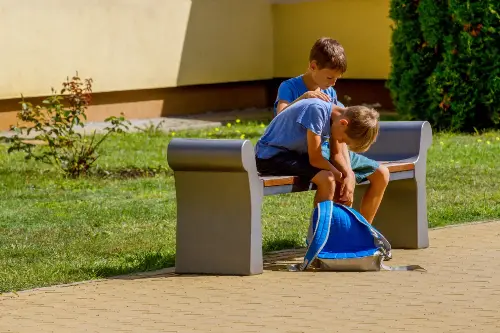In a world where digital connections often supersede face-to-face interactions, fostering empathy in children is more crucial than ever. Empathy, the ability to understand and share the feelings of another, is a fundamental component of emotional intelligence—an attribute that is vital for social harmony and personal well-being. As children navigate an increasingly interconnected global society, parents play a pivotal role in cultivating empathetic skills early in their child's life.

Lead by Example
Children are perceptive spectators of the adult world and tend to mimic the behaviour of their caregivers. If you wish to encourage empathy in your child, it's imperative to first examine your own actions. Are you considerate of others? Do you express concern for friends and family when they're struggling? When you model an empathetic lifestyle—by listening actively to others, showing compassion during difficult times, and treating others with kindness—your child observes and learns from your example. Narrate your empathetic actions to your child to give them a clear understanding. For instance, explaining why you offered a seat on the bus to someone or why you donated to a food bank helps connect the dots for children, revealing the impact of these gestures on other people's lives.
Read and Discuss Diverse Stories
Books are powerful tools for building empathy. Reading stories about characters from various backgrounds and cultures broadens children's understanding of different life experiences and emotional landscapes. Take time to ask questions like, "How do you think she felt when that happened?" or "What would you have done in that situation?" to engage with their capacity to empathise. Also, discussing the character’s emotions, actions, and consequences encourages children to put themselves in someone else's shoes, promoting empathy and emotional literacy.

Encourage Perspective-Taking Activities
Perspective-taking is at the core of empathy. Children need to recognise that their own viewpoint isn't the only one. Expose your child to role-playing games where they enact scenarios from other people's lives. Encourage them to think about how others feel in different situations, whether it's a classmate who doesn't get picked for a team or a friend who loses a pet. Ask prompting questions that invite them to consider feelings and perspectives outside their own. Phrases like "How do you think he feels right now?" or "Can you imagine what it would be like in her place?" help develop this skill.
Promote Emotional Vocabulary
Articulating emotions is a foundational step in developing empathy. Children who can identify and express their own emotions are more likely to recognise and respond to the emotions of others. Weave emotional language into everyday conversations. Offer specific words like "frustrated," "excited," or "disappointed" to describe feelings, and encourage your child to do the same. When your child is able to express how they feel, they are practising the same skills they need to understand someone else's emotions.

Cultivate a Helping Nature
Structured opportunities for helping others can reinforce empathetic behaviour. Whether you involve your child in community service projects, encourage them to assist a friend with homework, or support a family member in need, these acts of kindness help children understand the positive impact of empathy on their world. Experiences like these foster a sense of responsibility towards others and an appreciation for the power of helping and giving. They equip your child with the understanding that their actions can significantly affect the lives of those around them—for the better.
Fostering compassion in children is not just about making them better individuals; it's about shaping a more understanding and caring society. When we instil empathy in our children's minds and hearts, we prepare them for life's multifaceted social landscape and nurture a generation that values and demonstrates kindness. The empathy they learn now will reverberate throughout their lives, influencing their interactions and relationships for the better. As they grow and interact within broader communities, these empathetic skills will serve as a bridge to understanding and collaboration, ensuring a future shaped by compassionate, conscious citizens.
